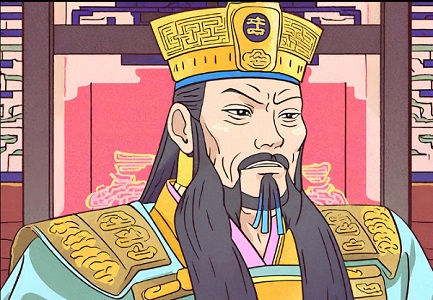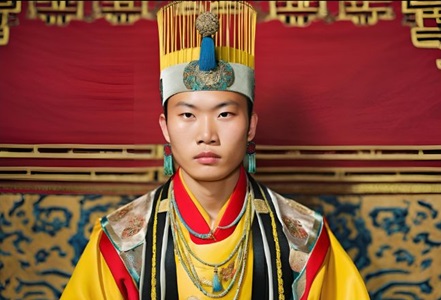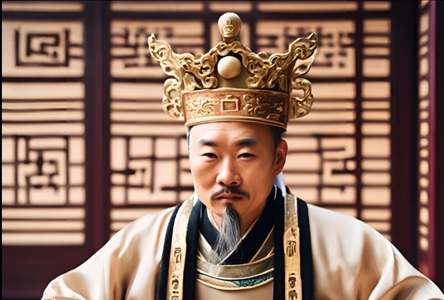Title of Biography in Chinese, Pinyin: 周文王传 (Zhōu Wén Wáng Zhuàn).
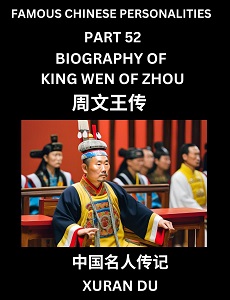
Title of Biography in English: The Biography of King Wen of Zhou.
Check out books on my Amazon and Barnes & Noble homepages as well as the following pages to learn Biographies of famous Chinese personalities-
- Part 1 – Chinese Biography Book Series for Beginners
- Part 2 – Chinese Biography Book Series for Beginners
- Part 3 – Chinese Biography Book Series for Beginners
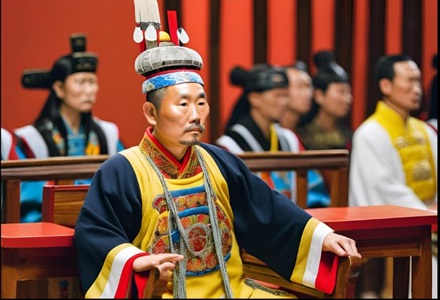
The Biography of King Wen of Zhou in English (英文传记)
Biography of King Wen of Zhou, Ji Chang
King Wen of Zhou, Ji Chang, was a remarkable politician, military strategist, and cultural pioneer during the late Shang Dynasty. Renowned for his wisdom and benevolence, he laid a solid foundation for the prosperity of the later Zhou Dynasty. Born into the Ji clan and titled King Wen due to his feudal domain in Zhou (present-day Qishan, Shaanxi), Ji Chang’s life was a testament to virtue and leadership.

Early Years: From a young age, Ji Chang was intelligent and eager to learn, earning the favor of his father Ji Li and grandfather Tai Wang. He governed with diligence and compassion, attracting many virtuous scholars such as Jiang Ziya, who contributed greatly to his future endeavors.
Benevolent Governance: During his reign, Ji Chang implemented policies that alleviated the burden on the people, encouraged agriculture, and bolstered the economy, making Zhou a powerful and beloved kingdom. He advocated ruling through virtue, opposing tyranny, and earning widespread respect and adoration.
Cultural Contributions: Beyond politics, Ji Chang was also a cultural giant. He revised and expanded the “I Ching,” an ancient Chinese classic on divination and philosophy, profoundly influencing later philosophies and thought. He also promoted a system of rituals and music, enhancing the cultural prosperity of the Zhou Dynasty.
Military Strategy: Facing the might of the Shang Dynasty, Ji Chang adopted a strategy of “cultivating culture and strengthening military forces.” He strengthened internal governance while preparing for war, utilizing cunning strategies to overcome crises and lay the groundwork for the eventual overthrow of the Shang.

With his legacy of benevolence, wisdom, and cultural achievements, King Wen of Zhou, Ji Chang, remains a revered figure in Chinese history.
Learn Biography Of King Wen of Zhou in Chinese (中文传记)

周文王姬昌,作为商朝末年杰出的政治家、军事家及文化先驱,他的一生充满了智慧与仁德,为后世周朝的繁荣奠定了坚实的基础。姬昌,姓姬,名昌,是周太王之孙,季历之子,因封地于周(今陕西岐山一带),故史称周文王。
早年经历:姬昌自幼聪慧好学,深受父亲季历及祖父太王的喜爱与栽培。他勤政爱民,广开才路,吸引了许多贤能之士前来投奔,如姜子牙等,为日后的发展积累了宝贵的人才资源。
仁政爱民:姬昌在位期间,实行了一系列仁政措施,减轻百姓负担,鼓励农耕,发展经济,使得周国国力日益强盛,民心所向。他倡导以德治国,反对暴政,赢得了广泛的尊重与爱戴。
文化贡献:姬昌不仅在政治上有所建树,还是一位文化巨人。他整理修订了《易经》,使其更加系统完善,对后世哲学、思想产生了深远影响。同时,他还倡导礼乐制度,促进了周文化的繁荣与发展。
军事策略:面对商朝的强势,姬昌采取了“修文治武”的策略,一方面加强内部治理,另一方面积极准备军事力量,为推翻商朝统治积蓄力量。他善于运用谋略,多次化解危机,为最终灭商奠定了基础。
King Wen of Zhou Biography Keywords- English, Chinese & Pinyin (关键词)

- 姬昌 (Jī Chāng): Ji Chang, name of King Wen of Zhou
- 周文王 (Zhōu Wén Wáng): King Wen of Zhou, title of Ji Chang
- 仁政 (Rén Zhèng): benevolent governance, referring to his rule characterized by kindness and justice
- 易经 (Yì Jīng): I Ching, an ancient Chinese classic on divination and philosophy revised by Ji Chang
- 礼乐制度 (Lǐ Yuè Zhì Dù): ritual and music system, promoting cultural prosperity and social order
Pinyin of King Wen of Zhou Biography (周文王传记的拼音)

Zhōuwén wángjī chāng, zuòwéi shāng cháo mònián jiéchū de zhèngzhì jiā, jūnshì jiā jí wénhuà xiānqū, tā de yīshēng chōngmǎnle zhìhuì yǔ rén dé, wèi hòushì zhōu cháo de fánróng diàndìngle jiānshí de jīchǔ. Jī chāng, xìng jī, míng chāng, shì zhōu tài wángzhīsūn, jì lì zhīzǐ, yīn fēngdì yú zhōu (jīn shǎnxī qíshān yīdài), gù shǐ chēng zhōuwén wáng.
Zǎonián jīnglì: Jī chāng zì yòu cōnghuì hàoxué, shēn shòu fùqīn jì lì jí zǔfù tài wáng de xǐ’ài yǔ zāipéi. Tā qín zhèng àimín, guǎng kāi cái lù, xīyǐnle xǔduō xiánnéng zhī shì qián lái tóubèn, rú jiāngziyá děng, wèi rìhòu de fǎ zhǎn jīlěile bǎoguì de réncái zīyuán.
Rénzhèng àimín: Jī chāng zài wèi qíjiān, shíxíngle yī xìliè rénzhèng cuòshī, jiǎnqīng bǎixìng fùdān, gǔlì nónggēng, fāzhǎn jīngjì, shǐdé zhōu guó guólì rìyì qiángshèng, mínxīn suǒ xiàng. Tā chàngdǎo yǐ dé zhìguó, fǎnduì bàozhèng, yíngdéle guǎngfàn de zūnzhòng yǔ àidài.
Wénhuà gòngxiàn: Jī chāng bùjǐn zài zhèngzhì shàng yǒu suǒ jiànshù, háishì yī wèi wénhuà jùrén. Tā zhěnglǐ xiūdìngle “yì jīng”, shǐ qí gèngjiā xìtǒng wánshàn, duì hòushì zhéxué, sīxiǎng chǎnshēngle shēnyuǎn yǐngxiǎng. Tóngshí, tā hái chàngdǎo lǐ yuè zhìdù, cùjìnle zhōu wénhuà de fánróng yǔ fāzhǎn.

Jūnshì cèlüè: Miàn duì shāng cháo de qiángshì, jī chāng cǎiqǔle “xiū wénzhì wǔ” de cèlüè, yī fāngmiàn jiāqiáng nèibù zhìlǐ, lìng yī fāngmiàn jījí zhǔnbèi jūnshì lìliàng, wèi tuīfān shāng cháo tǒngzhì jīxù lìliàng. Tā shànyú yùnyòng móulüè, duō cì huàjiě wéijī, wèi zuìzhōng miè shāng diàndìngle jīchǔ.
